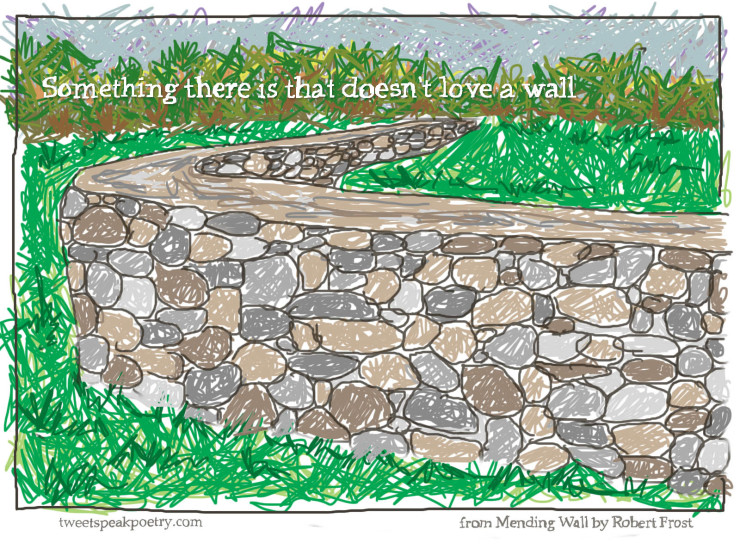< Return to Robert Frost Poems
Feelings run in various directions, regarding the Common Core standards, but one thing we notice in the standards is an emphasis on some pretty impressive poetry. We would love to see teaching methods attend to the heart and soul of these poems, using what we call the How to Read a Poem approach.
Beyond that, we believe one great way to engage with a poem is with a dose of good mischief. This partly explains our Common Core Picture Poems. What explains the rest? We’re Tweetspeak Poetry. We do have a reputation to uphold.
Mending Wall
—Robert Frost
About Robert Frost
Robert Frost was born in San Francisco in 1874. Following the death of his father when Frost was 11, his family moved to Massachusetts. He began writing poetry in high school and went on to study at Dartmouth and Harvard though he did not finish college at either. His first published poem, My Butterfly, appeared in New York’s The Independent in 1894.
Frost worked as a teacher, cobbler, newspaper editor and farmer, ultimately selling his unsuccessful farm and moving to England in 1912 where he published his first collection. He returned to the U.S. in 1915 and by the 1920s had published several collections and had become one of the most popular poets in the country. Deeply rooted in place, his poems often embodied rural New England. He would ultimately win four Pulitzer prizes for his poetry. His best known poems include The Road Not Taken, Mending Wall, and Stopping by Woods on a Snowy Evening.
He went on to serve as a college professor at various institutions and later was called upon to recite a poem at the inauguration of John F. Kennedy. Robert Frost died in 1963.
< Return to Robert Frost Poems
Try Your Hand?
Find something to love in Frost’s “Mending Wall” and explore it with a drawing or a poem of your own.
Browse more Poets and Poems
Browse our Teaching Tools
Read more Robert Frost
___________________________

- Earth Song Poem Featured on The Slowdown!—Birds in Home Depot - February 7, 2023
- The Rapping in the Attic—Happy Holidays Fun Video! - December 21, 2022
- Video: Earth Song: A Nature Poems Experience—Enchanting! - December 6, 2022

L. L. Barkat says
That is *some* wall. Looks like it will never come down. (His neighbor’s idea, no doubt 😉 )
I especially like, “Before I built a wall, I’d ask to know/what I was walling in or walling out.”
And the comment about the apple trees never eating the cones under the pines is quite amusing. If I could draw, that’s the drawing I might do. An apple tree sitting down to a pine cone dinner. 🙂
Maureen Doallas says
A perfect picture for teaching students about ekphrastic poetry and how visual poems can be.
Maureen Doallas says
Your wall – we don’t know from where it comes or where it is going – reminds me of Andy Goldsworthy’s at Storm King; it meanders and sneaks away to hide and then suddenly appears again, even crossing water: serpentine and especially beautiful in winter.
L. L. Barkat says
I thought the same, Maureen! 🙂
Sandra Heska King says
To each the boulders that have fallen to each.
And some are loaves and some so nearly balls.
We have to use a spell to make them balance:
“Stay where you are until our backs are turned!”
I’d be wanting to keep my eyes on that wall.
Megan Willome says
Around here, out in the country, we have some old walls, some of them more than 100 years old, just stone upon stone, like the poem describes.
Richard Maxson says
This registers with me:
He moves in darkness as it seems to me,
Not of woods only and the shade of trees.
He will not go behind his father’s saying,
And he likes having thought of it so well
KSR says
Something There Is…
The darkest evening of the year
I stop to lift a flask of cheer,
In shush of snow , but near to home;
My horse and I with naught to fear.
The wall now mounded pillows of stone—
And a sprite whispers “You’re alone,
gap the wall just to savor
the same words you hear him intone
Every spring: “Good fences make good neighbors.”
I’ll think of this night while we lift the boulders
and wonder if he’ll guess who doesn’t love
the wall as we stoop to our divisive labors.